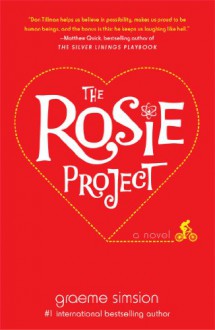
I could see it now: Our hero, entrenched in his monochromatic stagnant ways, seeking a way out of the tunnel of his loneliness and into the technicolor whirlpool of life vis a vis a romantic partner. It's a setting ripe for the emergence of that most complicated and terrible of tropes: the Manic Pixie Dream Girl. It was with trepidation that I read on.
Thankfully, my fears were unfounded. Rosie is, compared to Don, a normal girl. In fact, she is as far away from being a mere quirky object of the hero's affections as it is possible. She's not actually all that quirky -- Don merely finds her strange because he finds everyone strange. Whatever quirks she does have (dyed hair, vegetarianism, a penchant for pendants), Don just takes these things in stride. She has a backstory of her own -- arguably more of a backstory than Don himself -- and it's this which in fact forms the backbone of the entire story. This may start out as Don's story, but Rosie's own insecurities and problems play out centerstage, with Don as the prime mover. An interesting combination.
For a while, I considered the possibility that it was Don himself who played the Manic Pixie Dream Guy. He certainly is quirky enough, but I dismissed the idea almost immediately. Obviously, the man has his complications, his problems, and is proactive in solving them -- even if he does go about them in the wrong way. His story arc is more about opening up to possibility and decentralizing his life, but also in accepting that everyone is pretty weird, too. Still, Don's thought processes are charming, hilarious, sad, and sometimes completely relatable.
So while I give the romance three stars (I get that Don has difficulty expressing and even identifying his emotions, but Graeme Simsion still could have perhaps elicited that delicious gut punch of emotion from us anyway), the comedy and characterization gets a solid five stars from me.

 Log in with Facebook
Log in with Facebook 





